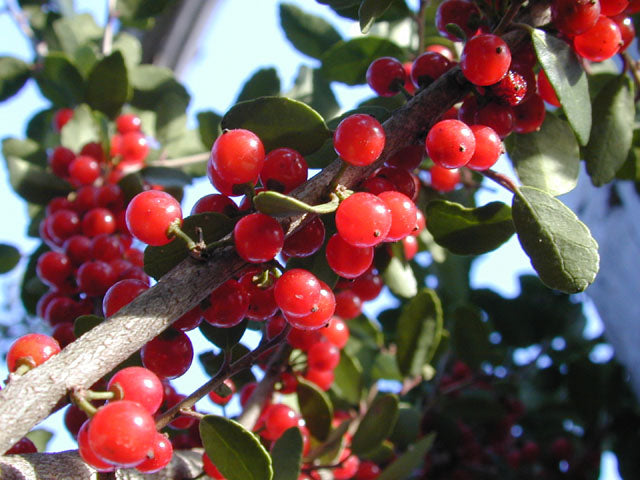Yaupon Holly 'Pride of Houston' (Ilex vomitoria 'Pride of Houston')
Yaupon Holly 'Pride of Houston' (Ilex vomitoria 'Pride of Houston')
Low stock: 6 left
Couldn't load pickup availability
Dermatophyllum secundiflora formerly Sophora secundiflora
Texas Mountain Laurel, Mountain Laurel, Mescal Bean, Mescal Bean Sophora, Frijolillo, Frijolito
Fabaceae (Pea Family)
Synonym(s):
USDA Symbol: sose3
Mescal bean or Texas mountain laurel is an evergreen, usually multi-trunked shrub or small tree ranging from just a few feet tall to more than 30 ft. in height, though its usual height at maturity is 10-15 ft. The dense, dark green, and glossy compound leaves are composed of 7-9 shiny, leathery leaflets that are rounded on the ends. The leaflets are up to 2 inches or more long, tapering more gradually to the base than to the tip, and arranged along an axis terminated by a single leaflet . The bluish lavender flowers, in 3-7 in. drooping clusters, are very showy and fragrant. The fruit is a semi-woody pod with bright red poisonous seeds.
Sophora secundiflora is very popular as a native evergreen ornamental tree within its range, valued for its handsome, dark green foliage and lush early spring blooms. It is drought-tolerant, prefers rocky limestone soil, and is native from central Texas west to New Mexico and south to San Luis Potosi in Mexico. Like many woody plants native to rocky soils, it is slow growing. The fragrance of Texas mountain laurel flowers is reminiscent of artificial grape products.
Plant Characteristics
Duration: Perennial
Habit: Shrub , Tree
Root Type: Tap
Leaf Retention: Evergreen
Leaf Arrangement: Alternate
Leaf Complexity: Simple
Leaf Shape: Elliptic , Ovate
Leaf Venation: Pinnate
Leaf Pubescence: Glabrous
Leaf Margin: Crenate
Leaf Apex: Obtuse
Leaf Base: Rounded
Leaf Texture: Smooth
Breeding System: Flowers Unisexual , Dioecious
Inflorescence: Axillary
Fruit Type: Drupe
Size Notes: 12-45 feet, but usually no higher than 25.
Leaf: Alternate, simple, evergreen, oblong to elliptic, rounded at the tip, rounded at the base, finely round-toothed along the edges, smooth, shiny, up to 1 1/2 inches long, up to 3/4 inch wide; leaf stalks hairy, up to 1/8 inch long.
Flower: Dioecious (only functionally male or functionally female flowers borne on any individual plant); male flowers 2-several clustered in fascicles in the axils of the leaves; female flowers 1-several in fascicles in the axils of the leaves.
Fruit: Drupes red, spherical, shiny, up to 1/4 inch in diameter, containing 4 nutlets. Although technically drupes, the fruit is commonly referred to as berries.
Bloom Information
Bloom Color: White
Bloom Time: Apr , May
Distribution
USA: AL , AR , FL , GA , LA , MS , NC , OK , SC , TX , VA
Native Distribution: S.e. VA to FL, w. to AR, s.e. OK, & s.c. TX
Native Habitat: Low, maritime woods; hammocks; sandy pinelands; limestone uplands.
Growing Conditions
Water Use: Low
Light Requirement: Sun , Part Shade , Shade
Soil Moisture: Dry , Moist
CaCO3 Tolerance: Low
Cold Tolerant: yes
Heat Tolerant: yes
Soil Description: Moist or well drained, sandy, loamy, clay, limestone, or gravelly soils.
Conditions Comments: Yaupon is a versatile plant that tolerates drought and poor drainage, with best production of red fruit when shrub gets half a day of sun or more.
Benefit
Use Ornamental: A densely branching, evergreen shrub or small tree that can take severe hedging and pruning. Females have decorative red berries. Many cultivars available, including weeping, columnar, and dwarf varieties.
Use Wildlife: Many species of birds eat the fruit but usually only in late winter after several freezes and thaws. Mammals eat the fruit as well, and the flowers attract insects. Birds employ the dense branches for nesting sites.
Use Medicinal: The young leaves and twigs contain caffeine and may be used to make a tea.
Use Other: Fruiting branches used as holiday decorations.
Interesting Foliage: yes
Attracts: Birds , Butterflies
Larval Host: Henry's Elfin butterfly
Nectar Source: yes
Deer Resistant: Moderate
Image Information
Photographer: Marcus, Joseph A.City: Austin
County: Travis
State: TX
Location Notes: Lady Bird Johnson Wildflower Center.
Accession date: 2003-09-15
Filename: 6151_IMG00564.JPG
Slide Index: Not Applicable
Restrictions: Unrestricted
Collection: Wildflower Center Digital Library
Original Format: Digital
Orientation: Landscape
Shot: Fruit
Date Taken: 2003
NPIN Image Id: 11610


